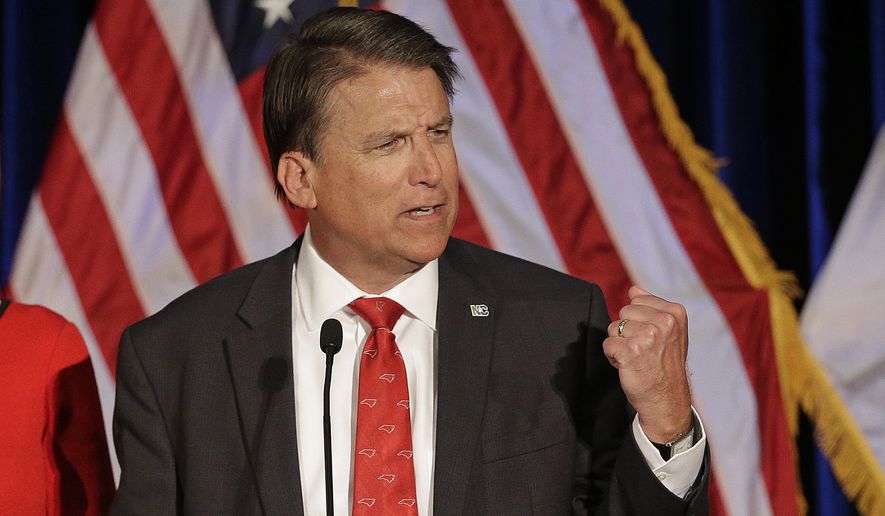The effort to rescind North Carolina’s hotly contested state “bathroom bill” has failed, after Republican and Democratic lawmakers adjourned a special session Wednesday without repealing HB2.
The state Senate voted 32-16 on a bipartisan basis against repealing the law, which requires public restrooms and locker rooms to be segregated based on biological sex rather than gender identity. The repeal measure included an amendment that would have prohibited local municipalities from permitting opposite-sex restroom access until a long-term, statewide compromise could be reached — an add-on that helped kill the repeal bill.
The gay rights movement — which spearheaded a boycott in North Carolina that cost the state the NBA’s All-Star Game, a host of NCAA championship games and a new PayPal office — condemned the legislature’s vote and accused Republicans of failing to hold up their end of the deal.
“It’s clear today that the GOP leadership’s cruelty towards lesbian, gay, bisexual and particularly transgender North Carolinians knows no bounds,” Chad Griffin, president of the Human Rights Campaign, said in a statement. “For our part, we will continue to fight to defeat all of HB2 and protect North Carolinians no matter what it takes.”
Outgoing Republican Gov. Pat McCrory called for the special session Monday, the same day that the Charlotte City Council voted to repeal its ordinance regulating intimate facilities on the basis of gender identity — the measure that prompted HB2 in the first place.
Mr. McCrory and leading Republican lawmakers offered months ago to look at repealing HB2 if Charlotte got rid of its ordinance, a deal the City Council rejected at the time. But at the behest of Attorney General Roy Cooper, who defeated Mr. McCrory in this year’s gubernatorial race by about 10,000 votes, the City Council changed its tune.
But distrust between the city and the state, the last-minute addition of the amendment and Republican infighting over HB2 ultimately derailed the repeal effort.
Republicans described the amendment as a “cooling-off period” that would have maintained the status quo until a compromise could be reached.
North Carolina Senate Leader Phil Berger, a Republican, said the unwillingness to accept the amendment on the part of Senate Democrats is evidence that Charlotte would have reneged on the compromise and reintroduced its ordinance after the repeal.
“Their action proves they only wanted a repeal in order to force radical social engineering and shared bathrooms across North Carolina, at the expense of our state’s families, our reputation and our economy,” Mr. Berger said in a statement.
The Senate voted to adjourn after the repeal effort failed, sending the proposed legislation back to committee and keeping HB2 in place at least until the legislature reconvenes next year.
Prior to the adjournment, the General Assembly was marked by Republican infighting over whether to repeal HB2 at all.
Lt. Gov. Dan Forest, a Republican, voiced his opposition to the repeal effort earlier in the day. He said Republicans would be naive to assume Charlotte would not reintroduce its city ordinance in the absence of HB2, which took the decision out of municipalities’ hands.
“I support HB2 and do not favor its repeal,” Mr. Forest said in a statement. “No economic, political or ideological pressure can convince me that what is wrong is right. It will always be wrong for men to have access to women’s showers and bathrooms.”
“If HB2 is repealed, there will be nothing on the books to prevent another city or county to take us down this path again,” he said. “The left has already publicly stated the removal of HB2 is necessary for the rest of their agenda to move forward. With certainty, if HB2 is repealed, we will fight this battle all over again with another city or county. The names will change, but the national groups who are pushing this agenda will not stop until their social engineering is accomplished. The only thing stopping them are those of us who continue to stand strong.”
Skepticism over Charlotte’s intentions reached a fever pitch Tuesday, after state lawmakers accused the City Council of repealing the ordinance only in part. The City Council took reparative action to repeal the ordinance in its entirety on Wednesday, but the damage had already been done.
“There’s no way this was a technicality,” Sen. Andrew Brock, a Republican, said during deliberations over the repeal. “No way that this was a technicality at all. To sit there and try to play games like this for so long, this is the worst political stunt that I’ve ever seen.”
“With Charlotte’s track record, there’s nothing that would prevent Charlotte a week from now from going in and proposing the exact same ordinance,” said Sen. Harry Brown, a Republican.
• Bradford Richardson can be reached at brichardson@washingtontimes.com.




Please read our comment policy before commenting.